2014-2015 Book History Colloquium at Columbia University
The Book History Colloquium at Columbia University, open to any discipline, aims to provide a broad outlet for the scholarly discussion of book history, print culture, the book arts, and bibliographical research, and (ideally) the promotion of research and publication in these fields. Our presenters include Columbia faculty members and advanced graduate students, and scholars of national prominence from a range of institutions.
Questions? Email Karla Nielsen.
All sessions take place 6pm in 523 Butler Library, Columbia Morningside Campus, unless otherwise noted.
SPRING 2015
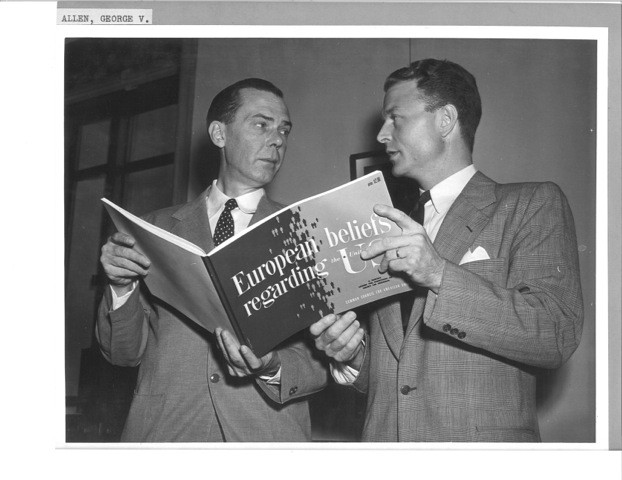
FEBRUARY 5 (Thursday)
Cold War Modernists: Art, Literature, and American Cultural Diplomacy
Greg Barnhisel, Associate Professor of English, Duquesne University
During the 1950s, after President Eisenhower created the United States Information Agency, the translation and dissemination of American books abroad—by public and private bodies, overtly and covertly—became a key component of American cultural diplomacy. In western and central Europe, books spread American ideas of freedom and individualism and refuted Communist arguments that the U.S. was uncultured. In the nonaligned world, American books forcefully confronted Soviet and Chinese cultural outreach and bolstered anti-Communist political movements. But even in this, U.S. cultural diplomats encountered domestic opposition from conservative forces who questioned their Americanism. In this talk, Greg Barnhisel will outline the various programs to distribute and promote American books abroad in the 1950s, describe the concepts of loyalty and Americanism that influenced which books were approved, and look at William Faulkner as a particularly emblematic but also problematic figure in the 1950s book program.
Followed by a Q&A with Matt Hart, Assistant Professor of English, Columbia University
Greg Barnhisel is Associate Professor and Chair of the Department of English at Duquesne University in Pittsburgh, PA and co-editor of the journal Book History. His publications include James Laughlin, New Directions, and the Remaking of Ezra Pound (2005), Pressing the Fight: Print, Propaganda, and the Cold War (2010), and Cold War Modernists: Art, Literature, and American Cultural Diplomacy (2015).
Co-sponsored with Columbia University Press

FEBRUARY 26 (Thursday)
The Future of the (Digital) Book
Diana Taylor, Professor of Latin American Studies and Performance, New York University and Alexei Taylor, interactive designer
This talk addresses two major quandaries regarding the future of the (digital) scholarly book. The first has to do with the concept of ‘book’ when applied to books written for the screen and read on phones by generations that have grown up with the internet and touch screen devices. What role does a press have when ‘books’ are designed and coded by technologists, preserved on the cloud, and disseminated through social media? What implications does this have for the classroom? For academic institutions grounded in libraries? For legal and classification regimes such as copyright and ISBNs? The second question has to do with the changing understanding of scholarship itself. The speakers will provide examples from the digital books they have created to address these issues.
Diana Taylor is University Professor and Professor of Performance Studies and Spanish at NYU. She is the author of the award-winning Theatre of Crisis: Drama and Politics in Latin America (1991), Disappearing Acts: Spectacles of Gender and Nationalism in Argentina's 'Dirty War' (1997), The Archive and the Repertoire: Performing Cultural Memory in the Americas (Duke U.P., 2003), which won the Outstanding Book from the Association of Theatre in Higher Education, and the Katherine Singer Kovacs Prize for Best Book in Latin American and Hispanic Studies from the Modern Language Association. She has received many awards and fellowships, including the Guggenheim Fellowship in 2005, Phi Beta Kappa Visiting Scholar award (2012-13), and the 2013-14 ACLS Digital Innovation Fellowship. She is founding director of the Hemispheric Institute of Performance and Politics.
Alexei Taylor is an interactive designer of screen-based publishing and authoring systems. As the co-founder of TypeFold, a company that develops digital publications and software, Taylor’s focus is on a variety of authoring systems for classrooms, e-books, interactive journals, and virtual museums that utilize maps, augmented reality, streaming data and community. He has taught graduate and under graduate classes in design and technology and uses this experience to challenge the role of interactivity, collaboration and media in pedagogy. Taylor holds an M.P.S from NYU’s Interactive Telecommunications Program.
Co-sponsored with the Hispanic Institute of the Department of Latin American and Iberian Cultures at Columbia University and the Center for Digital Research and Scholarship at Columbia Univeristy
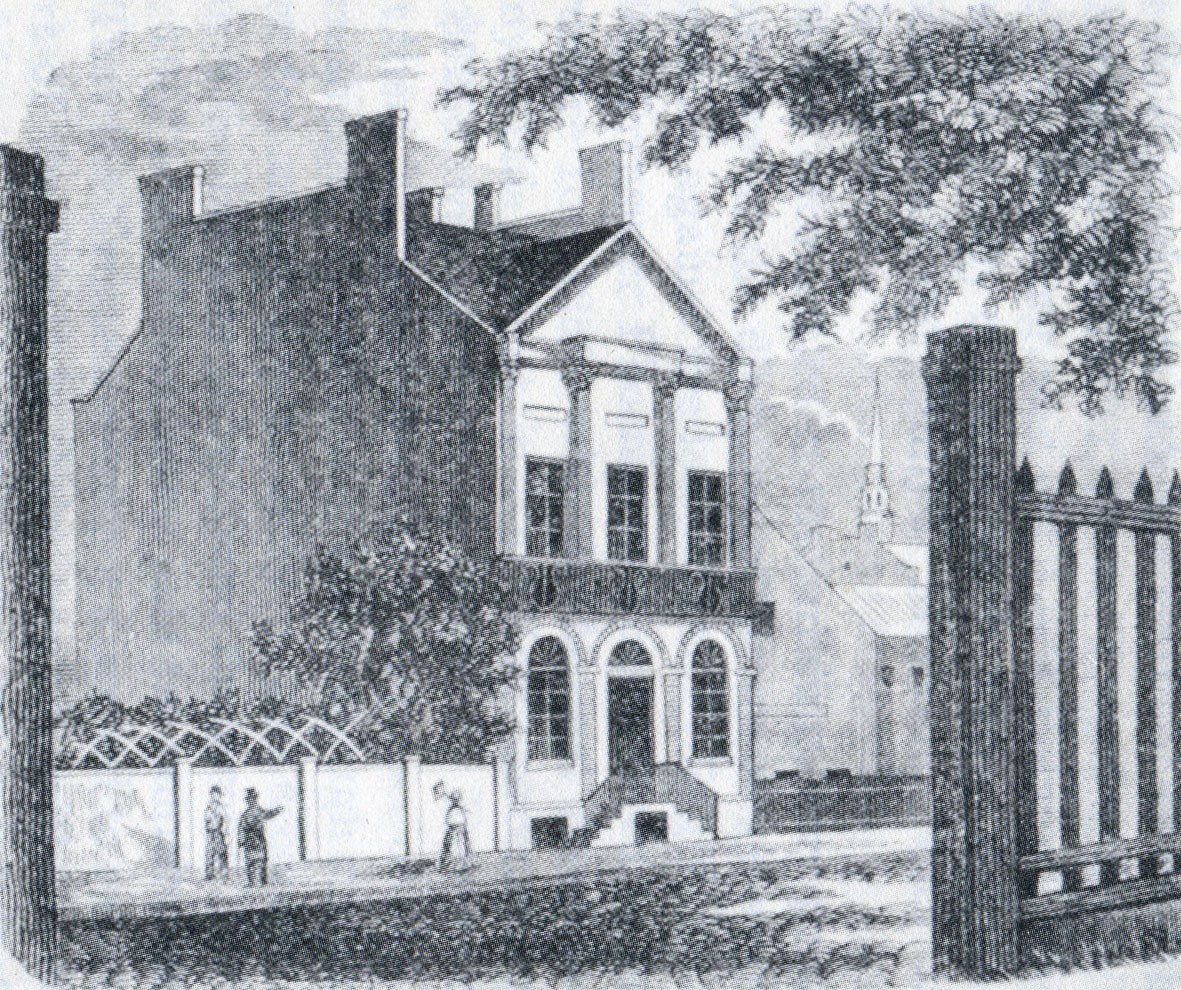
MARCH 23 (Monday)
Books & Barrels: Readers and Reading in Colonial America
Anthony Grafton, Henry Putnam University Professor of History, Princeton University
NOTE This event will take place at the New York Society Library: 53 East 79th Street (at Madison Ave.); RSVP information below.
The settlers of New England and the Mid-Atlantic states brought many practices with them from New England. One of them was reading: a particular kind of reading, intensive, engaged, and carried out with pen in hand. Lawyers, fur traders and alchemists worked their way through difficult and demanding books, many of them in Latin, and recorded what they thought of them on blank pages and in margins. This lecture will examine some of these readers--notably the members of the Winthrop family, many of whose books are held at the New York Society Library, and James Logan of Philadelphia--and their books.
Anthony Grafton is the Henry Putnam University Professor of History at Princeton University. Professor Grafton’s special interests lie in the cultural history of Renaissance Europe, the history of books and readers, the history of scholarship and education in the West from Antiquity to the 19th century, and the history of science from Antiquity to the Renaissance. Professor Grafton is the author of ten books and the coauthor, editor, coeditor, or translator of nine others. He has been the recipient of a Guggenheim Fellowship (1989), the Los Angeles Times Book Prize (1993), the Balzan Prize for History of Humanities (2002), and the Mellon Foundation’s Distinguished Achievement Award (2003), and is a member of the American Philosophical Society and the British Academy. Professor Grafton’s current project is a large-scale study of the science of chronology in 16th- and 17th-century Europe: how scholars attempted to assign dates to past events, reconstruct ancient calendars, and reconcile the Bible with competing accounts of the past.
To RSVP please contact the NYSL events office at events@nysoclib.org or (212) 288-6900 x230 and indicate that you want to attend the Columbia BHC Grafton event.
Co-sponsored with the New York Society Library
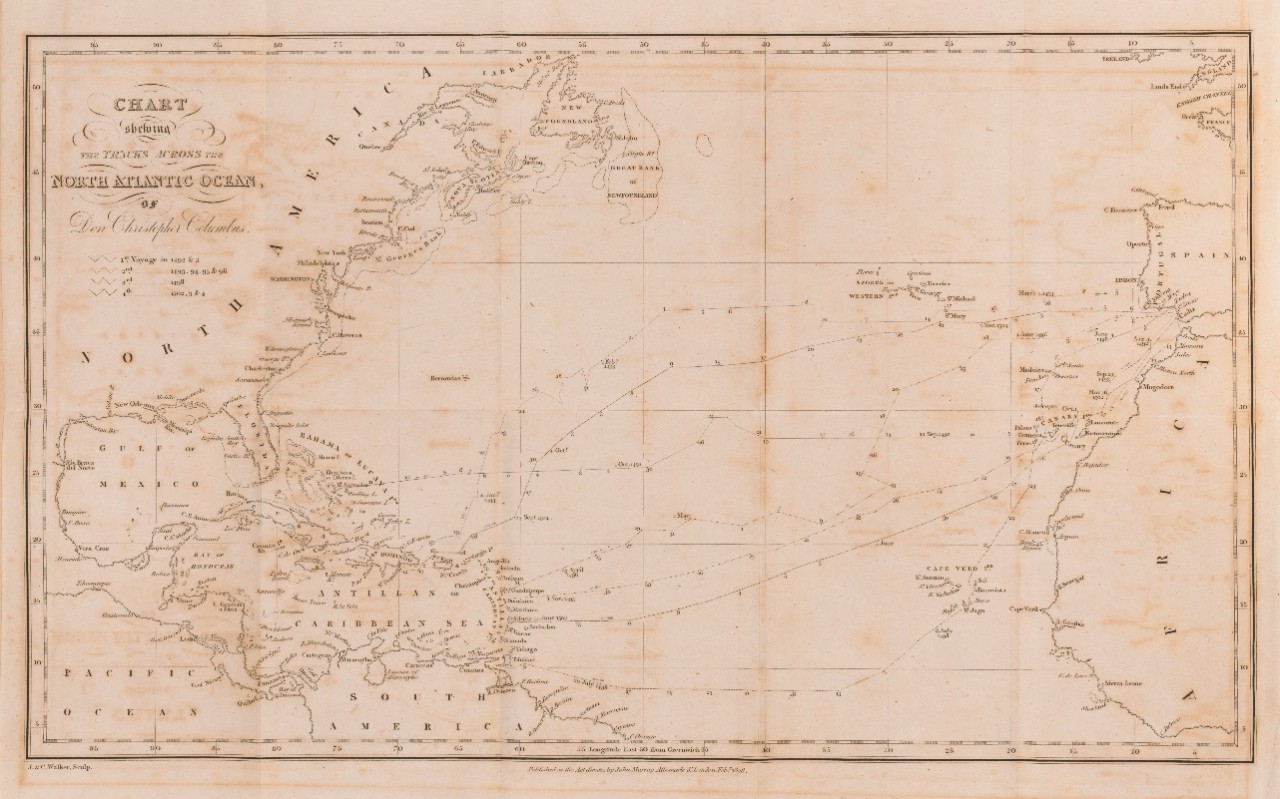
APRIL 16 (Thursday)
The Geography of History: Plotting Columbus in Map and Narrative
Lindsay Van Tine, Ph.D. Candidate in English, Columbia University
In the nineteenth century, an era in which geography was held to be the “eye of history,” books ranging from Bibles to exploration narratives included prominent fold-out maps. Yet modern scholarly editing and digitization practices have made these crucial paratexts invisible to most readers, and even book historians have tended to overlook them as the province of cartographic history. Taking the fold-out maps appended to Washington Irving’s A History of the Life and Voyages of Christopher Columbus (1828) as a case study, this talk will explore their material and formal features to shed new light on the geopolitics of Irving’s bestselling work. The maps reconstruct Columbus’ transatlantic routes on the basis of fifteenth-century documents recovered from Spain’s imperial archives and plot these routes on the most up-to-date, scientifically-surveyed hydrographic charts, thus materializing the legacy of “discovery” by collapsing past and present into a single geographic frame. Maps like these have much to show us about the material links between book and map printing, the relation of narrative history to geography, and the spatial imaginaries of the nineteenth-century Atlantic World.
Lindsay Van Tine is a Ph.D. Candidate in English and Comparative Literature at Columbia University specializing in American literatures to 1865, with a particular focus on entangled Atlantic World colonialisms, New World historiography, Anglo-American proprietary authorship, and archival accumulation in the United States. She is currently completing a dissertation entitled “Translated Conquests: Archive, History, and Territory in Hemispheric American Literatures, 1823-1854,” which bridges hemispheric studies and book history to explore the process by which the United States claimed New World history and territory through the material archive of Spanish empire. Her research has been supported by fellowships from the McNeil Center for Early American Studies, the Library Company of Philadelphia, and the Harrison Institute for American History, Literature, and Culture at the University of Virginia.
Fall 2014
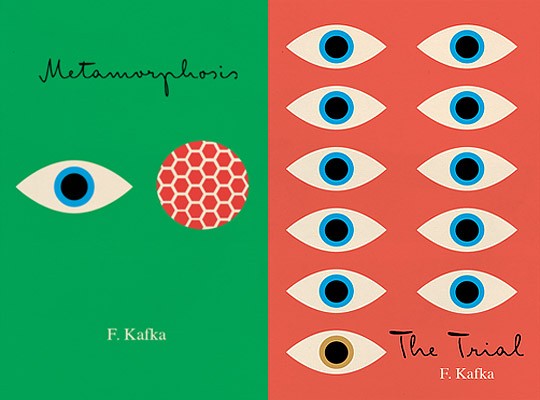
SEPTEMBER 23 (TUESDAY)
Cover Design and the Visual Enactment of Literature
Peter Mendelsund, book designer
Introduced by Ben Marcus, fiction writer and Professor, Columbia University School of Arts
Drawing on a life-long engagement with reading and a celebrated career as a book designer, in this talk Peter Mendelsund will discuss his two August 2014 publications—Cover, which focuses on his book cover designs and What We See When We Read, an illustrated phenomenology of reading that explores how we visualize images from reading works of literature.
Peter Mendelsund is a book designer, Associate Art Director at Alfred A. Knopf Books, and author of Cover (Powerhouse, 2014) and What We See When We Read (Doubleday, 2014). Designer behind the recognizable The Girl with the Dragon Tattoo series covers, he has also designed book jackets for writing by Joyce, Kafka, Dostoevsky, de Beauvoir, and Foucault, Martin Amis, Tom McCarthy, Ben Marcus, Jo Nesbø, and James Gleick.The Wall Street Journal notes that Mendlesund creates “the most instantly recognizable and iconic book covers in contemporary fiction.” Mendelsund blogs about reading and design at Jacket Mechanical.
Co-sponsored with the Columbia University Creative Writing Program
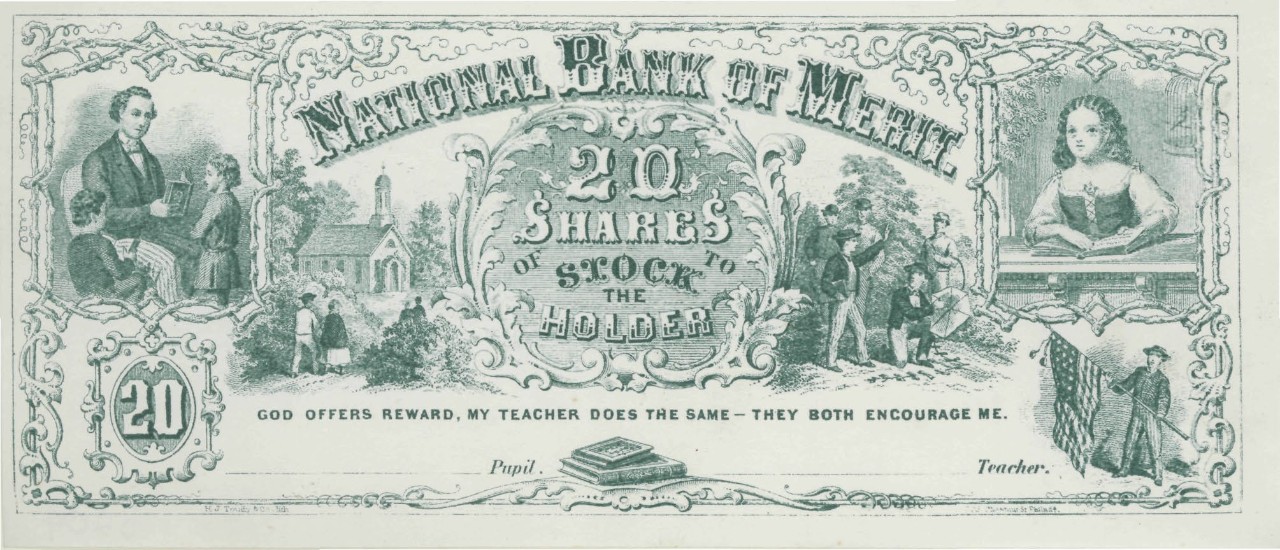
OCTOBER 20 (MONDAY)
“The Bank of Industry”: Rewards of Merit and the “Emotional Capitalism” of Nineteenth-century Children’s Print
Patricia Crain, Associate Professor of English, New York University
The reward of merit is one of very few dedicated childhood print genres. A premium handed out in the nineteenth century schoolroom, the reward of merit imitates other nineteenth-century documents, especially currency, stock certificates, transportation and entertainment tickets, and voting ballots, as well as parlor prints. They exhibit the full array of nineteenth-century visual iconography and advertise, often self-consciously, the printer’s art. This paper explores the reward of merit’s iconology, and the ideology of making the classroom into a site of mock-capital exchange, one that imagines childhood as the place to transact the business of what one set of rewards calls “the bank of industry.”
Patricia Crain teaches in the English Department at New York University and is the author of The Story of A: The Alphabetization of America from The New England Primer to The Scarlet Letter (Stanford, 2000), as well as articles on children and print culture in the nineteenth century. Her current book on children and reading in America is forthcoming in 2015 from the University of Pennsylvania Press.
Co-sponsored with the Herbert H. Lehman Center for American History, Columbia University
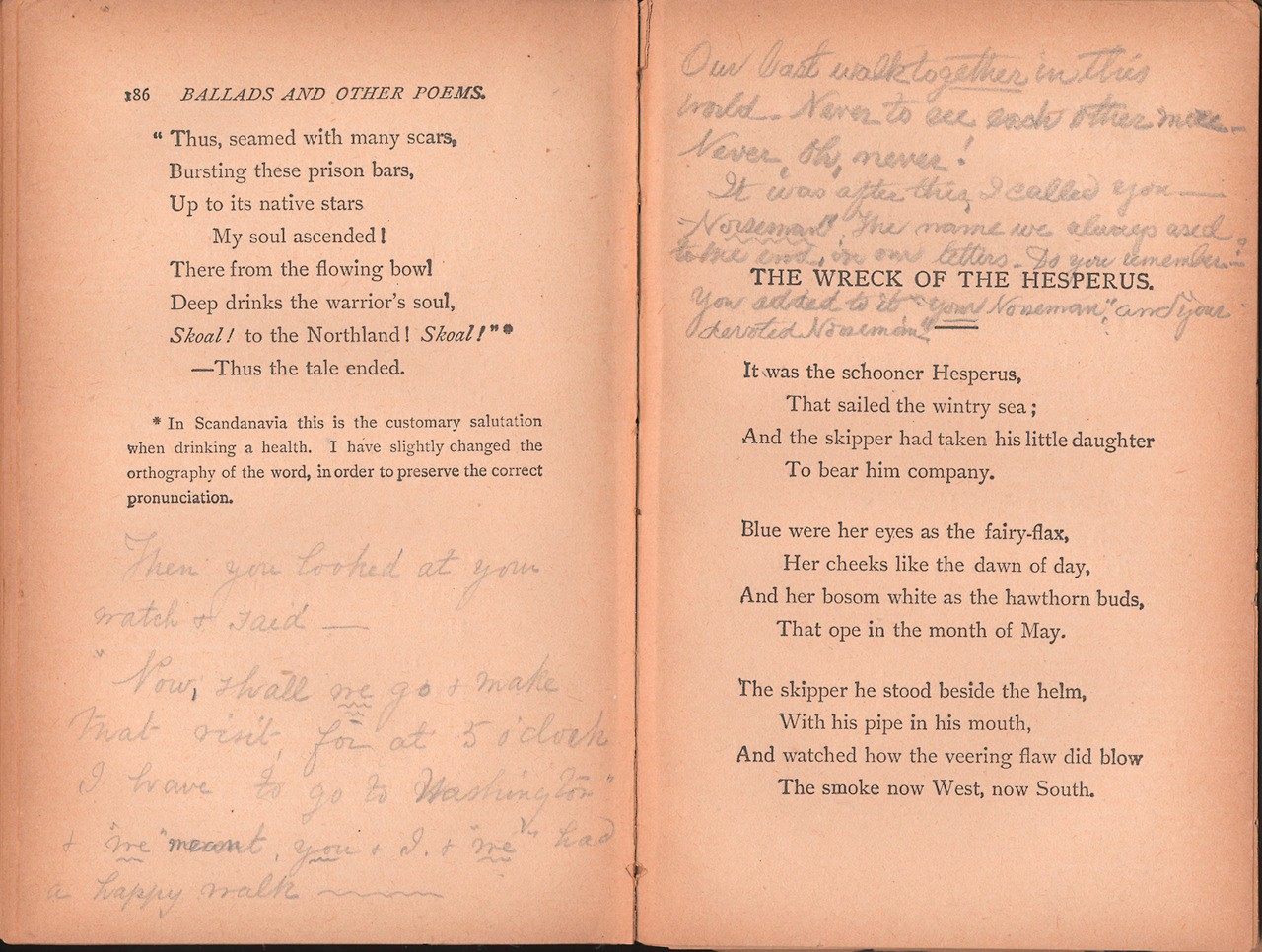
OCTOBER 28 (TUESDAY)
Traces in the Stacks: 19th-Century Book Use and the Future of Library Collections
Andrew Stauffer, Associate Professor of English and Director of NINES, University of Virginia
The Book Traces Project engages the question of the future of the print record in the wake of wide-scale digitization. College and university libraries increasingly reconfigure access to nineteenth-century texts through public-domain versions via repositories such as Google Books on the assumption that copies of any given nineteenth-century edition are identical. The Book Traces Project argues otherwise, focusing attention on the customizations made by original owners in personal copies of books to be found in the open stacks of university libraries, and showing that these books constitute a massive, distributed archive of the history of reading. Marginalia, inscriptions, photos, original manuscripts, letters, drawings, and many other unique pieces of historical data can be found in individual copies, many of them associated with the history of the institution that collected the books.
The Columbia University Libraries will sponsor a Book Traces-related “treasure hunt” in the Butler Stacks on October 8. This talk will review the findings from that day, discussing compelling examples that were discovered by Columbia students and faculty.
Andrew Stauffer is an Associate Professor of English at the University of Virginia, and Director of NINES (Networked Infrastructure for Nineteenth-century Electronic Scholarship). He specializes in 19th-century British literature and the Digital Humanities. Stauffer launched the Book Traces project in 2014, following two years of sending students into the general stacks of the University of Virginia libraries to discover unique copies of nineteenth-century editions of Romantic and Victorian poetry. He has published articles on various Romantic and Victorian writers, including Byron, Dickens, and Dante Gabriel Rossetti. His book Anger, Revolution, and Romanticism was published by Cambridge University Press in 2005, and he is currently working on a book entitled, "Postcard from the Volcano: The Troubled Archive of Nineteenth-Century Literature."
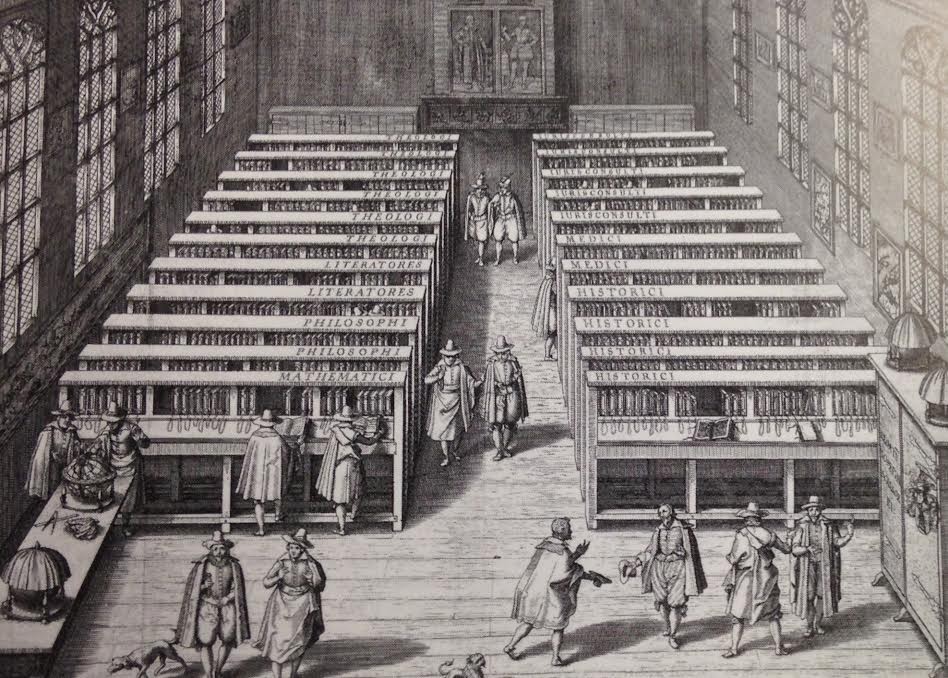
NOVEMBER 13 (THURSDAY)
Catalogue as Map in the Library of Ferdinand Columbus
Seth Kimmel, Assistant Professor of Latin American and Iberian Cultures, Columbia University
Ferdinand Columbus (Christopher’s second son) was an avid bibliophile who amassed one of the largest libraries of the sixteenth century. The series of catalogues that he devised to navigate his collection have long captivated historians of the book. Yet Ferdinand was an accomplished cartographer as well as a librarian. Along with a team of experts based in his hometown of Seville, Ferdinand helped to compile Peninsular topographical data and to keep the Crown’s world map up-to-date, even as he worked tirelessly to build his book and print collection. Drawing on Ferdinand’s catalogues as well as a series of testaments composed around the time of his death, this presentation examines the intertwined relationship between bibliography and cartography in the early modern period.
Seth Kimmel is an Assistant Professor in the department of Latin American and Iberian Cultures at Columbia University. His research focuses on Early Modern Iberia, theories of secularism and religion, the history of reading, and cultural exchange and conflict among Iberian Christians, Muslims, and Jews. Kimmel’s current book project is an intellectual history of New Christian assimilation. The book argues that canon law, Oriental Studies, and history writing were all transformed by hotly contested debates over eradicating Islam and Judaism from the Iberian Peninsula and converting non-Christians elsewhere in the Spanish empire.